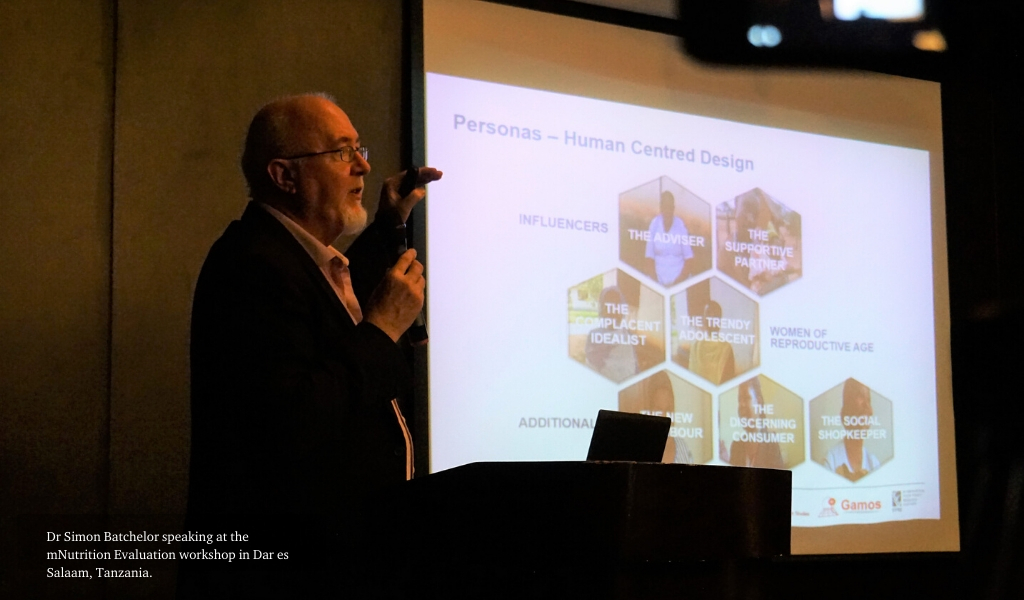Understanding the role of an mNutrition service within the day-to-day commercial business of a Mobile Network Operator (MNO) is not an easy task. mNutrition is a global initiative that uses mobile technology to raise the health and nutritional status of children and adults in the developing world, and so it usually sits within an MNO’s corporate social responsibility strategy. However those tasked with delivering these CSR programmes can often find that the working life pressures that they experience can influence their capacity to meet the initial ambitions of the service provision.

For the last two years I have been part of a mixed methods evaluation that assesses the impact of mNutrition in Ghana and Tanzania. My focus has been on the business model and cost effectiveness analysis component (pdf) and the Gamos team have recently published four reports: a business model analysis and cost effectiveness report for Ghana and a business model analysis and cost effectiveness report for Tanzania.
The ‘hidden’ pressures on the Mobile Network Operators
Within these reports it’s easy to lose sight of the human element. The pressures and responsibilities on staff working on programmes within the MNO’s have often influenced the outcomes of our meetings. When evaluators like us come along with requests for data and interviews, and we sit there trying to understand how a mNutrition service fits into the complex beast that is an MNO, regrettably it often just adds to the stress that they already feel.
Managers have to report constantly on Key Performance Indicators (KPIs) and the pressure to deliver in a complex and competitive market can be intense. The stresses can include staff feeling there is a lack of time to complete all their allotted tasks, looming deadlines, the turnover both from career development and also from sickness, and the changing priorities from a constantly evolving business environment.
Taking more (Corporate Social) Responsibility
Take for instance one executive who worked within an MNO. Let’s call her Sheila as a pseudonym. Working in the commercial department of a local MNO, Sheila had been invited by the GSM Association (GSMA) to a workshop to consider ‘sustainable business models’ for mNutrition. She had become aware of the CSR activities supporting mNutrition, and that the MNO was providing ‘zero-rated’ (free) relevant SMS messaging to a third-party agency that was creating and delivering the messages.
Sheila noted that these activities and the service were rarely mentioned in the meetings where the CSR department shared their work with all the MNO staff. With her new responsibilities for development of the MNO commercial sections, she wondered whether there was more that the MNO could do with this provision. For instance, the MNO almost never mentioned the mNutrition service in their advertising to the public.
Sheila considered whether the MNO itself could gain more goodwill by advertising its contribution to the health of the country. Most MNOs publicise any Value Added Service (VAS) offered as part of any bundle- with a view to increasing brand credibility and customer loyalty. Furthermore, the government nutrition services would surely welcome any additional investment in profile for the service, as this would complement government investment in media and behaviour change campaigns and help the service gain more users through general advertising. She left our conversation determined to “investigate further” and to try to ‘mainstream’ the mNutrition service.
Back to reality – the life of an MNO
And yet time overtook, other work kept moving it down her ‘to-do’ list, and eventually we heard that Sheila had moved upwards and sideways into another role with different responsibilities. As far as we know, in the absence of her vision and drive, her ideas have not found root in the MNO.
This is the reality of the busy life of an MNO. Those who have the drive and ideas, work their way up in the organisation, and inevitably move on. They don’t always have the time to implement all their ideas. An idea doesn’t have time to take seed and with no one able to invest in it, an opportunity is missed.
So how do we as evaluators capture this sort of detail? This highlights that the role of an individual champion is really important, and I believe it can often mean the difference between a sustainable, effective business model and one that is not. I hope to be able to explore this in more detail as the evaluation progresses.
Simon Batchelor is a co-Director at Gamos and a co- PI of the External evaluation of mobile phone technology based nutrition and agriculture advisory services in Africa and South Asia.